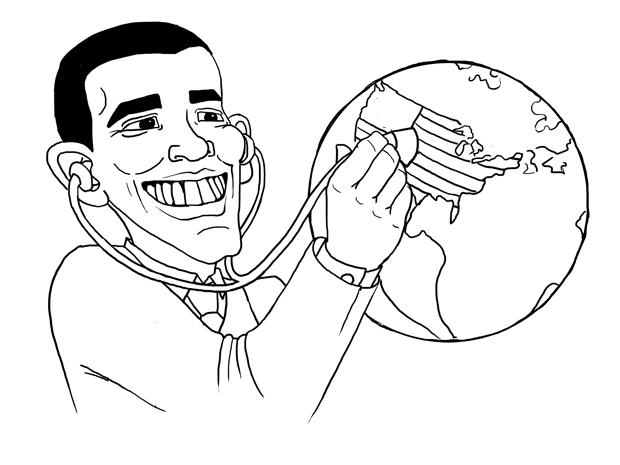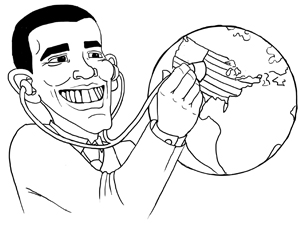
By Lisa Anderson
To say the 2,000-plus pages constituting the Patient Protection and Affordable Care Act (ACA), commonly known as Obamacare, are complicated is an understatement. Alas, there are certain core problems many acknowledge.
First, it doesn’t affect everyone equally, including students. There are students who do not yet have insurance, and if they do, it’s through their parents, work, school or themselves.
For students without healthcare, they will need to purchase some by the beginning of 2014. We all know the struggle is real enough already without adding about an extra $145 a month (estimated cost for a 27-year-old with an income of $25,000).
The struggle expands beyond the scope of college students, but generally, students will not benefit from the ACA. The insurance playing field is essentially supposed to be sort of leveling out, which means young people will no longer have the upper hand.
Since insurance companies now can’t discriminate against those with pre-existing conditions, they also can’t favor those who are healthier, which is generally younger people.
For those who have insurance through their parents, it definitely seems great that they have until age 26 to get their own. However, because of seemingly great benefits like this the cost of insurance is rising in general.
Since more coverage is now legally mandatory in even the most basic insurance packages, premiums are rising. However, many say that the rates have been rising continuously regardless of the ACA.
So if you’re on your parents’ plan and they can continue to afford it, it’s not really a con for you.
If you have insurance through your work, you can only hope that they aren’t just biting the bullet and paying the fine for not providing health benefits.
What’s more likely is that you aren’t working enough hours to score those benefits (you have to be full-time) and if you are, your company may very well stop giving you those hours.
If you have insurance through CSUN, CSU healthcare premiums have been rising, so perhaps the ACA is actually better for you. Also, some student health plans are not forced to comply with certain protections from the law such as the caps on annual or lifetime benefits.
Once the health exchange marketplace opens up, you will be able to more easily compare rates of different insurance companies, and this is the same if you have insurance on your own.
The real dispute here is if premium rates are rising. President Barak Obama and advocates for the ACA say that rates are not rising, but many others contend that they are.
It seems to boil down to this question: just how broke are you? If you get a student healthcare plan, you can include that in your financial aid package – if you’re broke enough to have one. Or perhaps you’re poor enough to be eligible for Medicaid, meaning you’re making about $15,800 a year in California.
But perhaps you’re in this awkward purgatory where you’re not quite broke enough for those assistances and subsidies, yet you don’t actually have enough for insurance. You could settle for the catastrophic insurance plan where you’ll pay less in premiums, but more towards actual costs if you do suffer some sort of catastrophe.
The biggest schism in how the ACA will affect people is highly dependent on their health. For those who are sick, the ACA generally seems excellent for not discriminating against that.
However even for aspects of the bill that seem positive, like ending lifetime caps and discrimination against preexisting conditions, there will be unintended consequences. We do need healthcare reform, but the ACA is not it.
OBAMACARE IS NEEDED IN A DYSFUNCTIONAL SYSTEM
By Mona Adem
You say no to Obamacare.
I say, I wish you had to eat, sleep, walk and work with tremendous pain simply because you
happen to be uninsured.
You say no to Obamacare.
I say, one day it may be you who has to hold your crying child in your arms, powerless and forced to watch your child in agony.
You say no to Obamacare.
I say, how would you feel if you suddenly had to say goodbye to your uninsured sibling because it was too late to save her life, knowing that if only had she been insured, the story might have turned out differently?
A recent study has shown that between 1990 and 2010, the U.S. fell from 18th to 27th among wealthy nations in early deaths and life expectancy at birth. Compared to the other 38 countries in the study, the U.S. also has one of the highest rates of chronic illness and disability. (Go U.S.A.!)
In a country that upholds empty nouns such as democracy and equality, more than 45 million of its citizens were uninsured during 2012, according to the Centers for Disease Control and Prevention. Furthermore, nearly eight million children lack access to basic physical and mental health care services.(Go U.S…….A).
Don’t get me wrong. Obamacare is probably not the best or only solution to fix the broken state of healthcare in this country. But how exactly can you yield a different result from a dysfunctional system? And there is little doubt that the system is not only dysfunctional, but also archaic.
Although the U.S. ranked second in healthcare cost per capita ($8,608) in a study done by Bloomberg among the 48 countries included, it ranked 46th in healthcare efficiency. A system inferior to China, Iran, Mexico and Libya. This means that while the cost is one of the highest in the world, the turnout is significantly less and, additionally, less efficient when compared to all other nations in the study (Go U…..S…..A).
From 2000 to 2007, healthcare premiums increased by almost 90 percent, according to the organization Health Care for America Now. During the same period, the profit of the 10 largest insurance companies increased by 428 percent, from about $2 billion to $12 billion.
Meanwhile, during this year alone, “one in five American adults will struggle to pay medical bills,” according to a 2013 study. Furthermore, more than 35 million Americans (ages 19-64) will be contacted by collections agencies for unpaid medical bills, making it the “leading case of personal bankruptcy” in the country, outpacing credit card and mortgage bankruptcies (Go U…..).
Health insurance companies who adamantly oppose Obamacare are fully aware that implementation of the law will further compromise their profits. And this is a valid concern in light of our for-profit healthcare system model. This model does not aim to help the sick, the poor, or the vulnerable. Quite the opposite. It is a system that relies on a vicious cycle that celebrates and embraces chronic diseases and expensive illnesses. It is a system incapable of seeing people as anything more than profit extraction vessels. It is, first and foremost, concerned about stock prices and quarterly profits. So why would we expect anything different? As the great philosopher Plato once said, “We can easily forgive a child who is afraid of the dark; the real tragedy of life is when men are afraid of the light.”
It is about time to stop blindly and ignorantly supporting a system that benefits the very few at the extreme cost to so many. It is time we act with morality and compassion for those who need it the most. Obamacare is far from perfect, but it is a reform that can change the playing field for so many people, especially for those who need the support the most.
One day it may indeed be you who wishes you or your family member never got sick because even with insurance in this country, your future might still be doomed. And when that happens, how will you wish your fellow Americans had acted?






